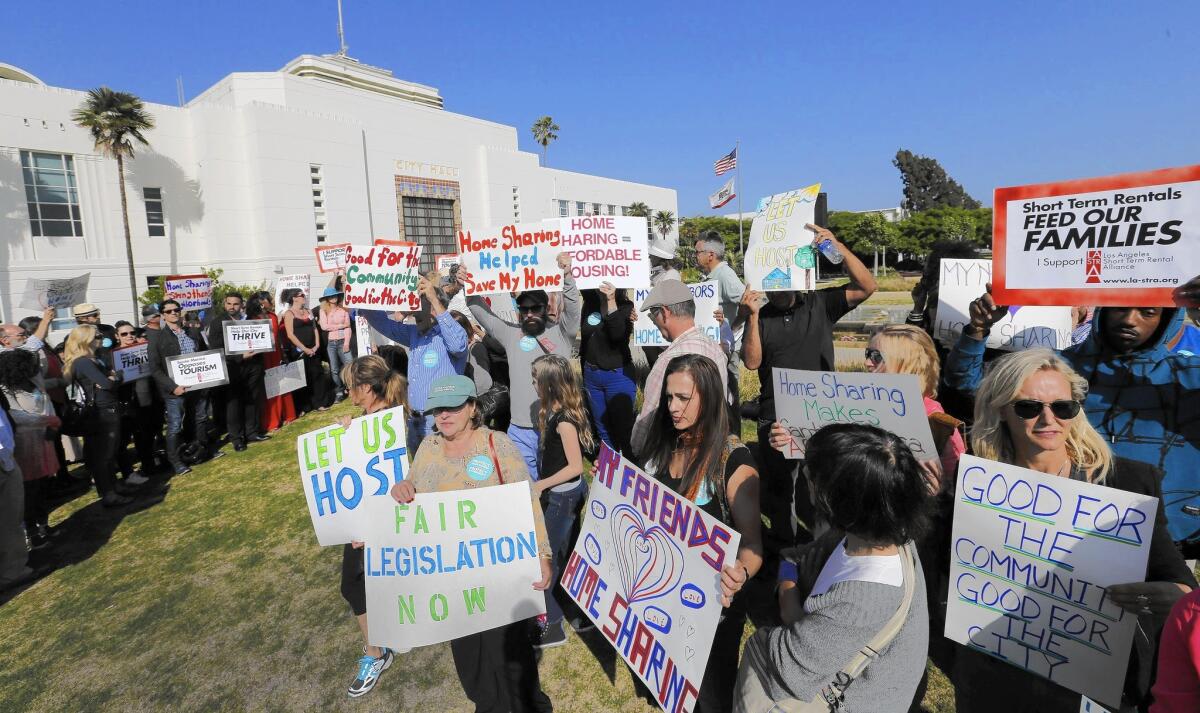Can Santa Monica — or anyplace else — enforce a ban on short-term rentals?

- Share via
Santa Monica has thrust itself into the national uproar over short-term rentals with the most aggressive crackdown yet.
City officials have explicitly outlawed rentals of less than 30 days. The law allows so-called home-sharing, such as renting a spare room, but hits hosts with licensing requirements and the city’s 14% hotel tax.
------------
FOR THE RECORD
Sept. 7, 2016: This article states that Santa Monica explicitly outlawed rentals of less than 30 days. In fact, such vacation rentals were already illegal. The 2015 law clarified the city’s ban on unsupervised short-term vacation rentals, but it allowed such rentals if the primary resident remains on the property, has a city business license and pays Santa Monica’s 14% occupancy tax.
------------
Santa Monica’s move could potentially energize short-term rental opponents around Southern California and in other vacation destinations nationwide — New York, San Francisco, New Orleans — that have seen similar actions. The bigger question, however, is whether it’s possible to effectively enforce any such law.
Santa Monica officials admit they may struggle to rein in the booming industry. The new rule outlaws more than 80% of the city’s estimated 1,700 short-term rentals, but the city plans to hire only two code enforcement officers and a data analyst with revenue from the home-sharing tax.
The explosion of tourist rental websites such as Airbnb is the latest challenge for governments struggling to keep up with technological disruption. With a unanimous vote of the City Council Tuesday night, Santa Monica set up a test case for how cities can rein in the so-called sharing economy.
Scott Shatford, who lists three units on Airbnb in Santa Monica, said he expects the more “entrepreneurial” short-term rental managers will find new ways to preserve their income.
“The profit margin is so great, and the demand is so great,” he said. “If people recognize the dollars are there to do it, they’ll figure out any possible method to make it work.”
Santa Monica’s restrictions aim to appease a coalition of irritated neighbors, affordable housing advocates and the hotel industry. But they are up against people and companies making good money renting out properties by the day.
They range from the home-sharing crowd — those who rent out a couch, a room or a backyard cottage — to sophisticated corporate players buying up dozens of properties and hiring professional managers. In between are small-time landlords who may have converted long-term rentals to daily or weekly, often doubling their income or better.
Shatford, for instance, is a Santa Monica-based entrepreneur who manages several Airbnb listings, wrote a book on home-sharing and runs AirDNA, a database that helps hosts price their units so they can “Airbnb like a pro.”
Contrast his story with that of 80-year-old Arlene Rosenblatt, a retired teacher who rents out her apartment when she goes out of town to see her children in Seattle and New York. The proceeds, she said, help her afford to stay in the pricey beach city on a fixed income.
“It’s such a blessing for us to have this money,” said Rosenblatt, who was worried Wednesday about what to do with several bookings she’s already got after the law takes effect next month. “We need to have these regulations changed.”
The reality for regulators is that the industry has already taken off, creating its own political and economic constituencies of property owners and customers. San Francisco-based Airbnb, the largest player, claims more than 1 million listings worldwide. Cities like Santa Monica should consider compromises rather than crackdowns, said Carl Shepherd, co-founder of vacation rental website HomeAway, based in Austin, Texas.
“It’s like they’re saying, ‘I’m not going to participate in the world in 2015,’” he said. “You can either deny this exists, or you can figure out how to make it safe. The latter’s probably the better thing for cities to be thinking about.”
Even before the council passed the new law — unanimously and with no public debate — short-term rental owners at a rally Tuesday were plotting ways to get around it.
Maybe they could advertise as a shared unit, which will be legal, but write in the fine print that it’s really a whole house, one suggested. Another planned to officially advertise rentals of 30 days — to get around the “short-term” restriction — but then later offer guests shorter stays.
Airbnb issued a statement expressing disappointment with Santa Monica’s vote. “This proposal fails to provide clear, fair rules for home sharing,” the company said. “We will continue to highlight the importance of fair rules with leaders in Santa Monica and throughout Southern California.”
Other cities across the Southland have been trying to figure out how to regulate the trend.
Anaheim and Malibu have recently passed measures that legalize short-term rentals, as long as hosts register and pay taxes. A task force in West Hollywood recommended a full ban. Los Angeles is studying new regulations, with proposals likely to start being written this fall.
“That is one of our tremendous fears,” said Robert St. Genis, spokesman for the Los Angeles Short-Term Rental Alliance, which represents vacation property managers. “We don’t want to see this end up in Pasadena, Manhattan Beach, you name it.”
It’s not clear that Santa Monica-style laws will spread, however.
A spokeswoman for hotel workers union Unite Here Local 11, which packed Santa Monica’s City Council chambers two weeks ago to support the measure, said the group hoped to see more cities follow suit, but has no other local campaigns planned. Roy Samaan, who authored a major study on short-term rentals and the housing market, said he hasn’t heard yet from other cities.
“I wouldn’t be surprised if Santa Monica passing its law gives this a little more momentum,” said Samaan, an analyst for labor-allied think tank Los Angeles Alliance for a New Economy. “But my phone’s not ringing off the hook.”
Right now, the fight is in Sacramento. A state Senate committee on Wednesday advanced a bill that would require online hosting platforms to share data with local governments on where units are being rented and for how much. Critics, including Airbnb, say the law intrudes on consumer privacy, but supporters say it’ll go a long way toward helping cities monitor a hard-to-track industry.
A Santa Monica staff report points out that, unlike most code enforcement cases, “these violations are frequently not in plain view.” San Francisco is re-working its regulations after just a few months, in part because few hosts registered their units with the city.
The nature of online platforms like Airbnb also makes their usage hard to police, said Paavo Monkkonen, an urban planning professor at UCLA and frequent Airbnb user himself. What’s to stop a tourist from striking up a personal relationship with a host in a place they visit frequently?
“The transactions ultimately are peer-to-peer,” he said. “If you’ve rented somebody’s apartment once, you can do it again.”
All of it highlights the challenge cities will face as they try to impose traditional regulations on a fast-evolving industry, Shatford said.
“It’s just a really short-sighted old method of trying to deal with a new-world problem,” he said. “They’re underestimating how quickly this market can adjust.”
Times staff writer Melanie Mason contributed to this report.
More to Read
Inside the business of entertainment
The Wide Shot brings you news, analysis and insights on everything from streaming wars to production — and what it all means for the future.
You may occasionally receive promotional content from the Los Angeles Times.










